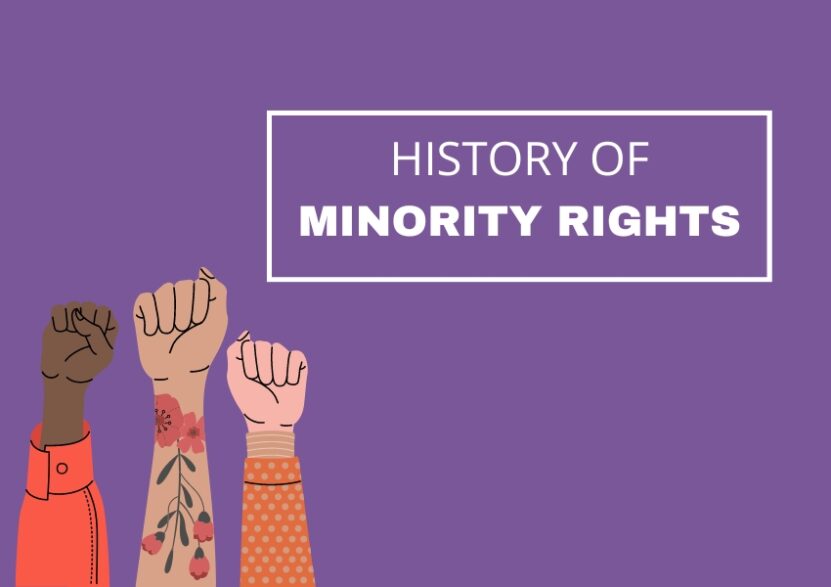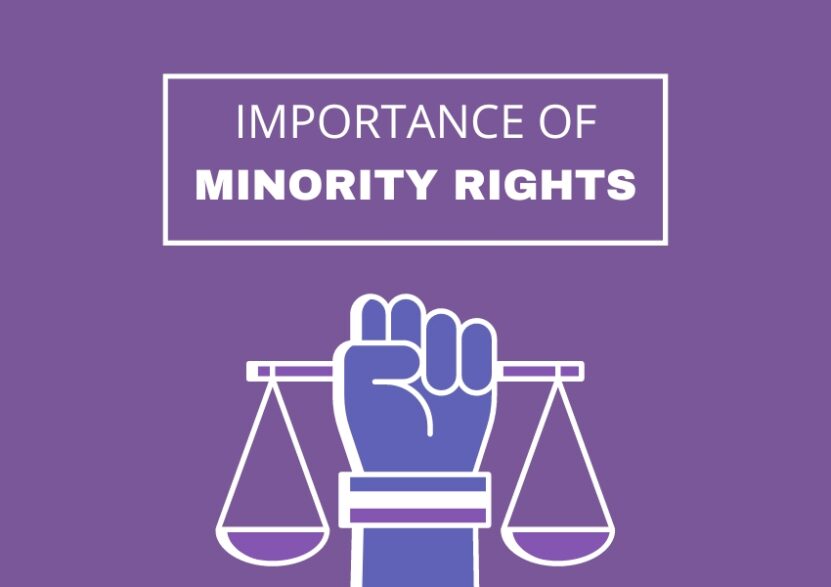Minorities are all national cultural, ethnic, religious and linguistic minorities whose minority status has been recognized by national legislation or by internationally binding declarations as well as minorities that define and organize themselves as such.
Minority rights are individual and collective rights through which people belonging to national minority groups are entitled to enjoy their own culture, to use their own language, to profess and practice their own religion, to have the right to freedom of expression and assembly, to have equal opportunities to education and employment, and to enjoy full participation in public life.
Minority rights are part of the general human rights framework and must be protected through national legislation, appropriate government policies, and the support of the civil society.
You can find an excerpt of our publication relating to minority rights with footnotes here.
History in a Nutshell

Minority rights protection was for the first time formally included within the international legal framework following World War I, through the League of Nations’ Minority Treaties. However, the League of Nations was dissolved in 1946.
After World War II, minority rights received significantly less attention, with the notable exceptions of the United Nations Convention on the Prevention and Punishment of the Crime of Genocide (the Genocide Convention), and the International Covenant on Civil and Political Rights (ICCPR), which includes minority rights protection under Article 27.
The collapse of the communist regimes in Central and Eastern Europe and the rise of ethnic nationalism, followed by the violent conflict in former Yugoslavia, changed the situation. From the early 1990s onwards, several international and regional human rights instruments that included minority rights provisions were adopted. Some of the most relevant ones are:
– the United Nations Declaration on the Rights of Persons Belonging to National or Ethnic, Religious and Linguistic Minorities (1992);
– the two Council of Europe treaties, the Framework Convention for the Protection of National Minorities (1995) and the European Charter for Regional or Minority Languages (1992) and;
– the Organization for Security and Co-operation in Europe’s (OSCE) Copenhagen Document (Art. 31-35) (1990).
Relevant related mechanisms are, inter alia, the OSCE High Commissioner on National Minorities, the Office of the United Nations of the High Commissioner of Human Rights, the UN Independent Expert on Minority Issues and the UN Forum on Minority Issues (former Working Group on Minorities).
At the national level, a significant number of states, including Kosovo, have adopted legislation that addresses the protection of minority communities and/or established institutions with minority protection included in their mandates.
Minority Right Protection
Minority rights are based on the recognition that minorities are in a vulnerable situation in comparison to other groups in society, namely the majority population, and aim to protect members of a minority group from discrimination, assimilation, prosecution, hostility or violence, as a consequence of their status.
It should be highlighted that minority rights do not constitute privileges, but act to ensure equal respect for members of different communities. These rights serve to accommodate vulnerable groups (meaning ethnic minorities, but also women, children and people with disabilities) and to bring all members of society to a minimum level of equality in the exercise of their human and fundamental rights. Furthermore, it is important to stress that members of national minorities must also respect the rights of the majority and that a national minority can represent a majority within a specific area, region or state.
Three main categories of fundamental rights central to ensuring the effective protection of minority rights can be established:
- The rights aiming to protect minorities from extinction and discrimination. As far as compatibility with the fundamental rights and freedoms of others, minority communities shall not be denied the right to be recognized as a group, enjoy their own culture and religion, use their own language, establish their schools, and receive teaching in the language of their choice.
- The rights are designed to preserve and safeguard the ethnic and cultural identity of the group. A pluralist and genuinely democratic society should not only respect the ethnic, cultural, linguistic and religious identity of each person belonging to a national minority but also create appropriate conditions enabling them to express, preserve and develop their identity.
- The rights aimed to empower minority communities. Minority communities need to have the authority to determine its own affairs and to be able to actively participate in state affairs. To put it simply, the state needs to create the conditions necessary for the effective participation of persons belonging to national minorities in cultural, social, economic and public affairs, particularly on issues directly affecting them. This includes achieving proportional representation in government positions, and active and equal participation in public affairs.
The Importance: Key Arguments

The following arguments illustrate the importance of minority rights:
1. Minority rights and the principle of equality: Minorities are often in a disadvantaged, marginalized and vulnerable position. Consequently, they require special measures to ensure that they benefit from the same rights as the rest of the population. Hence, minority rights serve to bring all members of society to a balanced enjoyment of their human rights. In other words, their aim is to ensure that persons belonging to a national minority enjoy effective equality with those persons belonging to the majority. In this context, the promotion of equal opportunities in access to education at all levels for people belonging to a national minority is particularly important, since education brings valuable development benefits, empowers communities and promotes the exercise of individual freedoms.
2. Minority rights strengthen inter-ethnic relations: The protection of minority rights is an exercise of tolerance and intercultural dialogue. By encouraging mutual respect and understanding, the different groups that comprise a society should be able to engage and cooperate with one another, while preserving their own identity. The basic elements required for the realization of this goal are to promote knowledge of minorities’ culture, history, language and religion in an intercultural perspective. In other words, the protection of minority rights can promote an inclusive, peaceful and cohesive society, with respect for diversity.
3. Minority rights’ impact on conflict prevention and resolution: Inter-ethnic tensions, divisions and exclusion that remain unaddressed can easily become a source of instability and conflict. Dealing efficiently with minority-majority relations in the aftermath of ethnic conflict is central to achieving durable peace. In this regard, the protection of national minorities is not only fundamental to enhance social cohesion in diverse societies, but also essential to achieve democratic security, sustainable development and peace in a context of instability.
4. Minority rights protect and promote a diverse and prosperous society: All societies in the modern world are multi-ethnic and multi-national. Ethnic diversity can enrich society as it makes it more attractive, competitive and prosperous. As such, it is important to create a climate of tolerance and inter-ethnic dialogue, not only to achieve peace and stability but to enable cultural diversity to be a factor of enrichment and social strength.
5. Minority rights as an essential element of the international human rights legal framework: States assume obligations and duties under international law to respect, to protect and to fulfill human rights, including minority rights. Minority rights, considered under the International Human Rights framework, are universal, inalienable, independent and indivisible. States, being the principal actors of the international community, have the legal and moral obligation to defend such standards.
6. Minority rights are European standards: European history has shown that the protection of national minorities is essential to the stability, democratic security and peace in the continent. The European Union (EU) promotes and insists upon respect for human and minority rights amongst its current and prospective members.
National minorities are entitled to and should be able to maintain and develop their culture and identity. Accordingly, minority rights aim to ensure that disadvantaged minorities maintain ‘their rightful place in society’.

